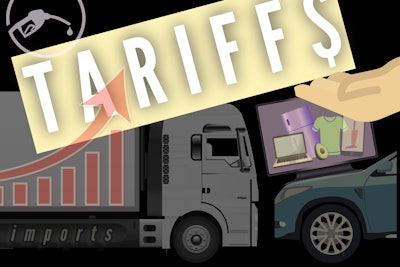
Tech.co's latest survey data reveals tariffs are disrupting business operations for the majority of U.S. logistics companies.
In fact, 69% of U.S. logistics companies say tariffs caused changes to their business operations in August. This highlights the widely disruptive effects tariff volatility is having on businesses within the U.S. logistics industry. And, just 18% of U.S. logistics companies said tariffs made no changes to business operations in August.
“Unfortunately, it’s not surprising to see that the vast majority of U.S. transport and shipping companies are making operational changes to prepare for the sweeping impacts of the Trump administration’s tariff regime, which is making it difficult for companies throughout the global supply chain to function with any semblance of normality,” says Tech.co’s content manager Aaron Drapkin. “Being forced to prepare for the double-edged sword of rising vehicle costs and reduced freight demand is putting huge financial pressure on logistics businesses, swallowing up bigger and bigger proportions of monthly budgets and ensuring there is less cash spare to invest in new technology and operational upgrades.”
“This comes after many businesses spent the last year or so front-loading inventory to escape the looming import cost hikes, meaning there has really been no respite for decision makers. Constant battles for lower rates to offset these higher duties and maintain existing profit margins look set to become the norm across the supply chain too, adding more friction, stress, and difficulty into the mix,” Drapkin adds. “On top of the real economic impact the tariffs are already having on businesses, what’s making things even harder for businesses to plan for the future is the fact that there could be further, major changes that upend things further. The administration’s entire trade policy may even be ruled illegal – and have to be completely reversed – if the U.S. Supreme Court decides so in November. This would mean tens of billions of dollars reaped from the tariffs would have to be returned. Crucially, this does not make for a productive business environment; business owners and decision-makers who should be thinking about new growth opportunities, product lines, and reaching new customers are instead being forced to answer extremely tough – and for some, existential – questions about the future of their operations.”
Key takeaways:
- 69% of U.S. logistics companies say tariffs changed their businesses operations in August.
- 48% of U.S. logistics companies prepared for rising vehicle costs in August due to tariffs.
- 38% of U.S. logistics companies prepared for reduced freight demand in August due to tariff uncertainty.
- Almost half (48%) of surveyed logistics businesses said that their company was preparing for rising increased vehicle and equipment costs in August as a result of tariffs.
- Data reveals volatility over the past few months in the number of businesses preparing for vehicle and equipment cost inflation. These fluctuations highlight the ever-changing business landscape that logistics companies must now adapt to.
- Tariff uncertainty is also prompting logistics companies in the U.S. to anticipate and prepare for reduced demand in freight. 38% of U.S. logistics companies said they prepared for reduced freight demand in August due to tariff uncertainty.
- Almost all (91%) of surveyed logistics businesses agree that America’s economy depends on fast, affordable, reliable freight movement. Freight bottlenecks are no longer just day-to-day challenges; they now threaten overall business continuity.



















